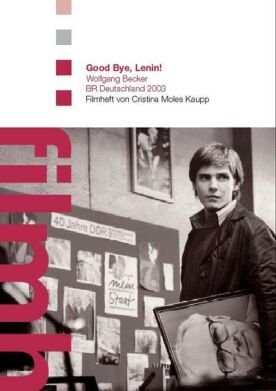Good-bye, Lenin
(Reviewed February 27, 2004)
|
| Rating: |
 
|
|
|
Order this DVD or VHS Tape through Amazon.com
|
By far the best movie I have seen this year is Wolfgang Becker’s funny, beautiful, immensely moving German film, Good-bye, Lenin, made from a screenplay by Bernd Lichtenberg. Set in East Berlin just before and after the fall of the Wall, it tells the story of Alex (Daniel Brühl), a young TV repairman in the DDR who has been taught by his mother, Christiane (Katrin Sass), to revere the achievements of their socialist motherland. Her husband, Alex’s father, fled to the West, so we are told, with another woman, a West German class-enemy, years before, when Alex and his sister, Ariane (Maria Simon) were children. A teacher, Christiane now spends her spare time helping the neighbors to write letters of complaint to officialdom. She thinks of herself as helping in a fraternal, socialist way to make life better for everyone, though the letters are all ignored.
One day in October 1989, his mother spots Alex being arrested at a free-speech demonstration and promptly suffers a near-fatal heart attack. She lies in a coma for months, well into 1990, while the Wall is being torn down, the East German state is collapsing and both the capital and the country are being re-united at the cost of considerable dislocation to those in the former Communist parts of it. When she finally comes to again, Ariane has got a West German boyfriend and a new job working at Burger King, Alex is working for a satellite dish company and is in love with a beautiful Russian nurse, Lara (Chulpan Khamatova). Meanwhile, everything from the clothes they wore to the food they ate to the furniture they sat on in East German days has vanished. At this point the doctor tells Alex that any sudden shock could kill his mother.
Like the good son he is, he embarks on the mad enterprise of restoring everything in their ramshackle apartment to the way it was before, so making it a time-capsule of the now defunct DDR. Ariane is persuaded, with some difficulty, to go along with the elaborate imposture, and the West German boyfriend, Rainer (Alexander Beyer), has to pretend, rather ineptly, to be an "Ossie" like them. Alex even has Denis (Florian Lukas), a pal from the satellite dish company who has ambitions to get behind the camera, make bogus news reports on videotape that he can play on television so that his mother won’t know that the world she knew before is now gone forever. These are spliced in to tapes of old East German newscasts which were all so boringly predictable that even his mother doesn’t realize she has seen them before.
At one point Alex’s vigilance is briefly relaxed and Christiane goes outside to see obvious Westerners walking the streets. When Alex catches up with her and brings her back to the apartment, he manages to persuade her that there have been influxes of Western refugees, fed up with capitalism, fleeing to the East — a claim which naturally chimes with her own belief in Communist superiority.
But soon we realize that it is really Alex and not his mother who is having a hard time coming to terms with the new, post-Communist world. He realizes it himself when he admits in retrospect that his little charade had "taken on a life of its own, and the made-up DDR was becoming the DDR I would have wished it to be." Socialism itself had been a way of protecting people from change and uncertainty, so it is natural for those like Alex who are threatened by really radical changes to their lives to want to cling to it for protection. As he gradually sees that he must let it go, the movie becomes a kind of elegy for the century just past, with all its dreams of a society engineered to be perfect — dreams which, it tells us, even the most fervent socialist true believers have finally had to abandon along with their poor, oppressive and badly-run but still cozy homeland.
But the split in their country is also a mirror image of the split in the family, especially when Alex learns that his father hadn’t left his mother for a woman at all but for the freedom of the West, where he had long hoped that she and the children would come and join him. When Alex finally meets his father, in the midst of his new family in the West, and when his father comes to visit his mother in the hospital, carrying a bouquet of flowers like a boy on his first date, it is almost unbearably touching. This emotional quality is further enhanced by the fact that all the characters are immensely likeable and by an absolutely ravishing musical score by Yann Tiersen, who also did the music for Amélie and The Dreamlife of Angels.
It should be mentioned that this movie is often cited as an example of what the Germans call "Ostalgie" or nostalgia for the former East (Ost) Germany where life was in many ways simpler and more secure than in the dog-eat-dog world of the capitalist West. This is not entirely untrue, but it seems to me to miss the point. I would rather say that Ostalgie here becomes a metaphor for that part of all of us that longs for the primitive, tribal-style community and equality that socialism once promised. Becker, a Westerner from a left-wing background, understands the connection between that longing and the childish desire — which long outlasts childhood — for the warmth and security of family life. He also understands what finally has to happen to it. 
[Top][Back]
|



